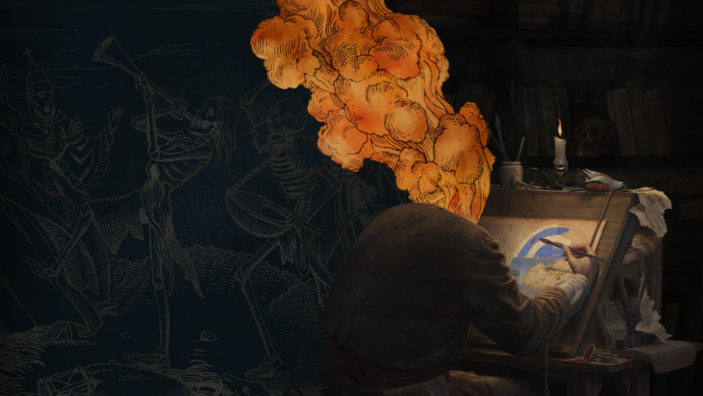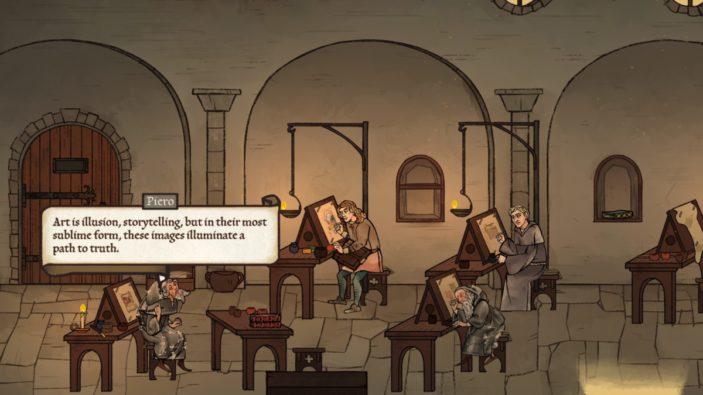
At first glance, Pentiment felt like a game I wouldn’t necessarily be interested in. I’m not big on medieval Eurpoean history, nor am I invested in the text-based gameplay that Pentiment thrives on. That being said, I’m glad I came across it. Pentiment is without a doubt the biggest surprise of 2022 so far, but I would imagine many who are not interested in this for one reason or another. would let this one pass by. Put simply, don’t. Be it a versatile and engaging protagonist, or an intriguing selection of supporting characters, Pentiment finds strength after strength in telling a deeply involved plot of murder and deceit, set against the backdrop of 16th century Bavaria. It’s also a fantastic history lesson, wrapping many of its historical accuracies into detailed and accessible explanations for added context and general world building. While it’s not much of a traditional video game in the way of mechanics, developer Obsidian Entertainment has crafted a story I won’t soon forget.
A Mystery to Solve
Players take control of protagonist Andreas Maler, an intelligent, aspiring artist who finds his way to the Bavarian town of Tassing, to work in the scriptorium (place for writing) of the nearby Kiersau Abbey. After a brief introduction to the surrounding world and supporting characters, Andreas is throwing into the depths of a murder mystery, that inadvertently digs up old secrets that town would rather leave untouched. You’ll get the chance to choose Andreas’ background from the very beginning, assisting with certain traits and knowledge for use in important conversations. While this rarely drives the story in various directions, but more so the outcome of a conversations, there is no doubt that Pentiment tells a fantastic story that sets a consistent pace, particularly once it gets going.

Pentiment does take a fair amount of time to build that optimal pacing, but does so with confidence and intent. Once things get going, you’ll understand the ins ands outs of the town and supporting characters, which naturally aids you in your investigation. Andreas is also a fascinating character that seems to adapt to various situations over a lengthy period of time. As you’ll be able to choose his backstory, you’ll also be able to define his traits and interests, even down to what he had studies in university. This will then unlock new dialogue options, particularly when certain ideas and texts are referenced. Throughout the 15-20 hour story, an emotional depth builds throughout each conversation and day spent with Andreas. As his personal stake in this investigation grows, the town’s input grows with him, driving the end result to a place that I admittedly did not pick, shaking my false sense of confidence and leaving me questioning my detective skills.
The Tools of the Trade
In terms of gameplay, Pentiment will take up most of your time in text-based conversation, where you’ll interact with various townsfolk for information. You’ll frequently need to choose your questions and answers from a set of predetermined options, but ever so wisely, as each choice yields mixed results in the quality of information given and the impending affect on the relationship at hand, be it friend or stranger. You’re frequently encouraged to draw upon prior knowledge and conversations to broaden your investigation as you slowly peel back layers of the truth.
Beyond this, you’ll also get the chance to complete various puzzles to uncover clues. While they’re not necessarily challenging, they are indeed wrapped into the essence of the overall enemy; time. Be it deciphering pieces of art or combing the texts of various books to put words and clues together, every thing you do in Pentiment will come at the cost of a day’s hours. The day will progress no matter what you do, meaning that you’ll more than likely need to roll with your initial choices in the hopes that they will provide the intended answers, or at least nudge you further in the right direction. In my initial play though, I felt as though I had progressed successfully, but I’m already curious about heading in for a second round just to see where else I could have driven the mystery.

Beyond gameplay and story, Pentiment prides itself on historical accuracy. With each conversation, many words will be underlined or written in red. On the Xbox controller, you’ll be able to hit the view button to access the glossary, giving you an instant explanation of each word, name and term in question. If you’re like me and don’t have much of an understating of 16th century Bavarian culture, Pentiment does a great job at providing simplistic explanations that are consistently relevant to the story, which serve as an important tool, particularly earlier on in the narrative.
Various townsfolk are also represented based on their script and font style, although this design choice can be disabled for easier reading. Villagers and common folk will display a grittier scrawling, making it slight harder to read, while more distinguished individuals like priests and other educated characters, display a bolder and neater style of text. Villagers will also make mistakes more frequently while they talk, having to track back at the end of a sentence as their mistakes are edited on the fly. Religious references like God and the name of Jesus Christ are written last and in red, yet another discovery that Pentiment had brought to my attention, while various conversations about tales and stories of distinct lands and battles are those that had been born of or shared within this particular time period. These small adjustments and inclusions go a long way in not only fleshing out the narrative of Pentiment, but allowing the world to feel lived in.
Tell Me a Tale
Visually, Pentiment is a joy to look at. It’s not particularly flashy in any discernible way, but serves to highlight the artistic qualities of the time. The minimalist approach is rarely affected when it comes to the unique character designs and lavish environments, particularly in the Kiersau Abbey. The authentic soundtrack also aids in adding a layer of immersion to the experience, which is no easy task, given the complete lack of any dialogue to accompany it. General dialogue is exceptional, and while no two conversations ever feel the same, they also feel equally important in building either the world or certain characters, leaving no moment feeling wasted. But as good as Pentiment is, I feel as though it relies on certain interests for maximum enjoyment. For as brief and snappy as most conversations are, you’ll more than likely find yourself reading through mountains of text, making this feel more like an interactive thriller as opposed to a more traditional video game.
Final Thoughts
Pentiment is without a doubt the biggest surprise of 2022. It initially drew me in with an intriguing tale of murder and deceit, with a versatile and memorable protagonist to boot. The town of Tassing is drenched both atmosphere, and conversations, as robust and varied as they are, either lend themselves to a heavy helping of historical accuracy or focused progression. Be it navigating the town, soling puzzles and gaining leads, Andreas and players alike must battle the concept of time, eventually accepting that there are only so many hours in a day. While the 15-20 narrative rarely overstays its welcome, I have no doubt that a second playthrough will prove newer, yet equally satisfying results.
FOUR AND A HALF STARS (OUT OF FIVE)
Highlights: Incredible, engaging narrative; Versatile protagonist; Historical accuracy
Lowlights: Game mechanics are rather simplistic
Developer: Obsidian Entertainment
Publisher: Xbox Game Studios
Platforms: Xbox Series X/S, Xbox One, Windows PC
Available: Now
Review conducted on Xbox Series X with a pre-release code provided by the publisher.
